Edinburgh International Book Festival reviews: Henry Marsh | Jonathan Freedland | Fintan O’Toole | Ali Smith | Mohsin Hamid
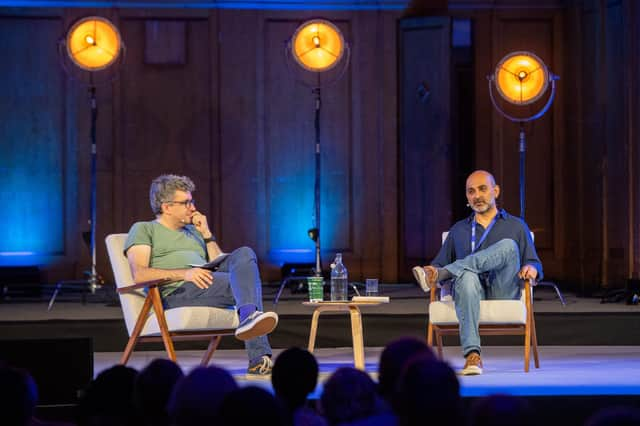

Let’s begin at the end. Well, not quite the end but near enough – the way you are when, like retired neurosurgeon Henry Marsh, the title you chose for your latest book is And Finally. Marsh apologised during his video link for not appearing in person at the Book Festival on Saturday, but at least he had a valid excuse: the sheer fatigue of travelling through a rail strike and a heatwave while terminally ill.
This was hardly the most upbeat start to a festival, but Friday night’s attempted murder of Salman Rushdie, who has more than once graced its stages, had already cast a pall.
Advertisement
Hide AdAwareness of mortality and the fragility of life suddenly seemed everywhere: certainly in a truly amazing story from the Holocaust by Jonathan Freedland (see below) but also in screenwriter Abi Morgan’s heartbreaking account of thecollapse of her husband’s physical and mental health, after which she herself found out she’d got breast cancer. As she pointed out: “The biggest joke of all is that we spend our whole lives trying to make a perfect life when we know how it all ends.”
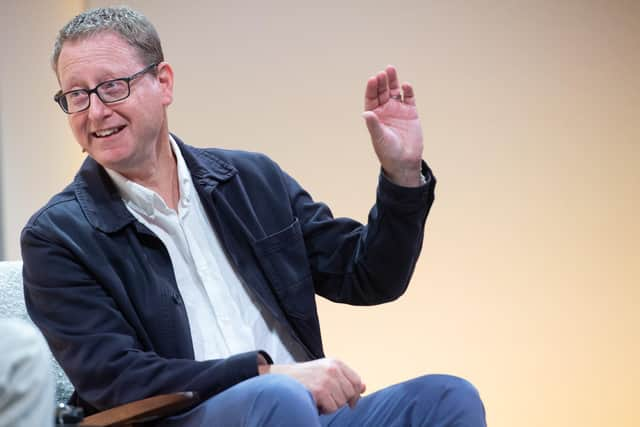

Yet if I were planning a book festival, I too would happily start with Marsh. His visceral honesty about things he got wrong in his career as a neurosurgeon sets a tone. Yes, he said, once he did indeed operate on the wrong side of a patient’s neck (“these days I’d be sacked”) and he has advised others to sue him (“my duty is to my patients, not my hospital or the defence union”).
True, too, he realises, now that he’s a patient and not a doctor, maybe he never did actually get the balance right between being compassionate and being detached. When he finally got the bad news about his cancer, he found himself thinking of the patients whose ordeal he could now better understand as they lined up in his memory “like reproachful ghosts”.
As well as such clear-eyed self-appraisal (and potent arguments for assisted dying), Marsh also offered an insightful analysis of how the NHS could be made more patient-centred. The one thing he is proudest of, he says, is building a garden next to two neurosurgical wards: just imagine, he added, if there had been a bit more thought about the architecture of “our 120 second-rate PFI hospitals built at vast expense”.
His is a life that is still open to the world and addresses so many of the same issues that this year’s Book Festival will also have in its sights. Take Ukraine: he has been visiting, teaching and working there since 1992 (and, though no longer conducting operations, he’ll be back in Kiev in October). Or climate change. He’s a pessimist. Why? Because we always rely too much on unrealistic hope, doctors often being the worst at procrastinating and denying the symptoms whose meaning they know full well. That’s what he did with his prostate cancer, and it’s what we’re all doing now with climate change, despite all the evidence.
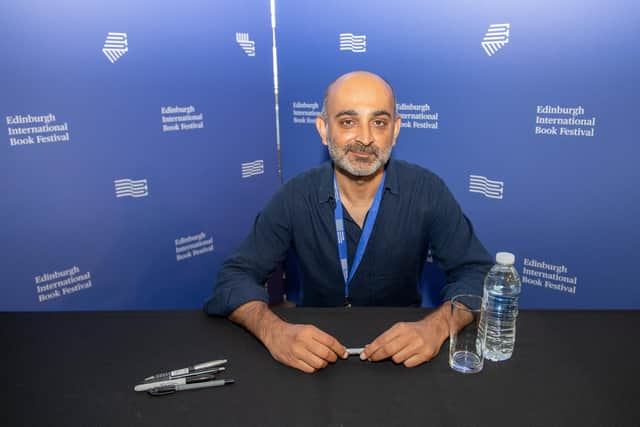

“Hope is a great survival mechanism,” he said. “But it is probably going to cause the extinction of the human race.”
Advertisement
Hide AdMaybe, though, it won’t be hope that kills us but wilful ignorance, the way people didn’t want to know about the Holocaust when Rudolf Vrba escaped Auschwitz and tried to tell the world what was happening there. Rudolf Vrba? No, me neither. Yet his story, Jonathan Freedland convinced me – along with, I suspect, the entirety of his audience – is one of the greatest in the entire Second World War. And while I’m still dishing out superlatives, let me add that Freedland does it full justice: check out the event online via edbookfest.co.uk and see for yourself.
There could hardly be a more intense drama than that of a 19-year-old boy evading 3,000 SS men and their dogs to become one of only four Jewish people to escape from Auschwitz. His mission? To shut downAuschwitz altogether by telling Jews what was happening there. By April 1944, this was still a real possibility, at least for 750,000 Hungarian Jews.
Advertisement
Hide AdFreedland followed Vrba’s report into a host of official cul de sacs. When it finally reached a British journalist in Zurich, whose story broke the bureaucratic logjam and propelled it to US president Franklin Roosevelt’s desk, most of those Jews were dead. But 200,000 in Budapest were not. I don’t think there’s a statue to the one man who saved them and I can’t work out why not.
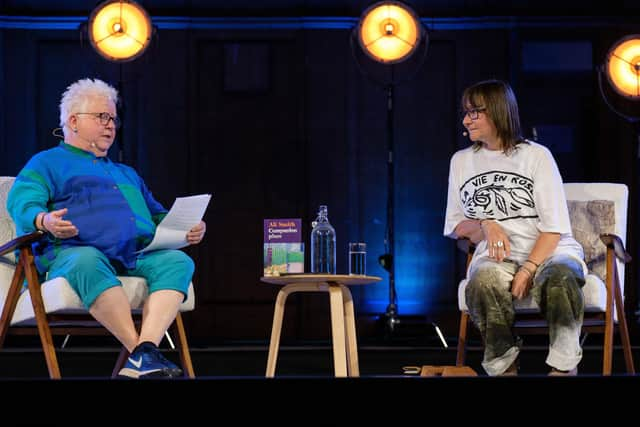

If the Catholic Church doesn’t come out well from this story (trust me on this) its record in post-war Ireland is hardly better. AsFintan O’Toole pointed out, when he was born in 1958, its hegemony was unchallenged. Dublin’s archbishop John Charles McQuaid officiated at a Mass at the church in which O’Toole, aged seven, was an altar boy: it felt, the writer said, like “a medieval princeling had come visiting”. What he didn’t know back then was that McQuaid’s church was already covering up a story about a paedophile teacher-priest down the road who took photos of boys’ genitalia.
In his book We Don’t Know Ourselves, O’Toole gives a highly personal account of how a kind of doublethink warped Irish attitudes to just about everything from homosexuality to the contraceptive pill to the IRA, but particularly the Church. When John McGahern moved to rural Leitrim, a neighbour asked him why he didn’t go to Mass. “I’d be a hypocrite,” the novelist replied. “Sure, none of us believe,” his neighbour said. “We just go along anyway.” This in a country which in 2015 became the first in the world to introduce same-sex marriage via a popular vote. Even before the 2018 abortion referendum, Ireland had changed beyond recognition, and O’Toole is its ideal chronicler.
As, over the last five years or so, Ali Smith has been Scotland’s. “Did you ever realise back in 2016 that the years of your Seasonal Quartet novels would be so, er, interesting?” asked an admiring Val McDermid, before going on to discuss the “fifth” one, Companion Piece, which playfully slips between Covid Britain and a medieval past in which the post-Black Death Poor Laws penalised rootless vagabonds and in a sense locked them down too. In it, she makes the point that books aren’t only enjoyable but “one of the ways in which we can imagine ourselves otherwise”.
For Mohsin Hamid, that’s a given: his novel The Last White Man, imagines race as being so fluid and changeable as to ultimately become meaningless. Because the reader’s imagination has to do the work, he said, the novel has the power to make us change the way we think, and at least offers the possibility of a more inclusive, plural world. “Writers blur boundaries and challenge ideas about what it is permissible to say,” he said. “One response to threats is silence. Another is commitment to storytelling with a particular transgression that brings people closer.”
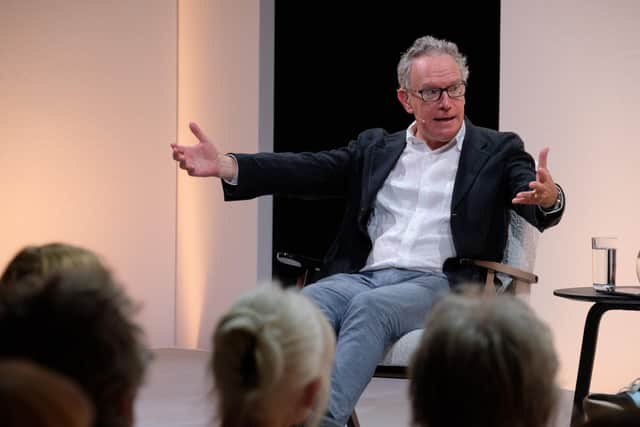

Some 12 hours after the festival started, director Nick Barley gave its opening party the news that Salman Rushdie had regained consciousness and didn’t appear to have suffered significant brain injury. A long, full, fascinating day ended with a sliver of hope.